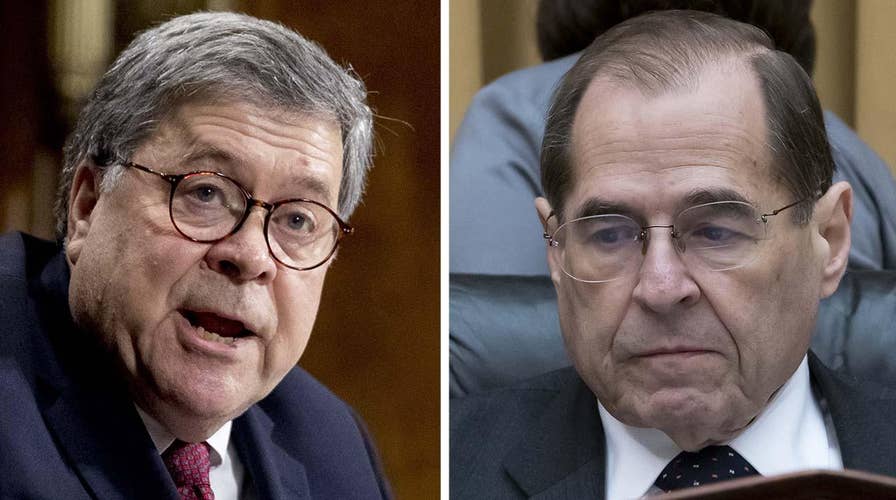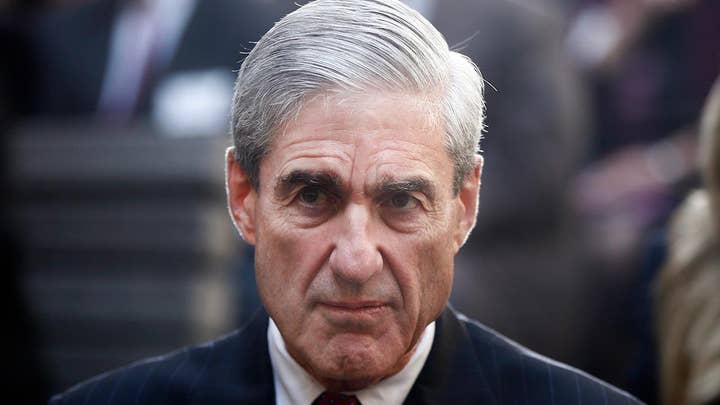Nadler, Barr head towards contempt showdown
Reaction from national security analyst Bradley Moss and former deputy assistant attorney general John Yoo.
The House Judiciary Committee voted Wednesday to recommend holding Attorney General Bill Barr in contempt of Congress for defying a subpoena for Special Counsel Robert Mueller’s unredacted Russia report and underlying documents, after President Trump asserted executive privilege in a bid to protect those files from release.
Both developments represented a major escalation in the already-tense fight between the two branches of government over access to information the Justice Department says cannot be legally released.
The committee's 24-16 vote on contempt for Barr was along party lines and came after hours of debate. House leaders will now decide whether to take up the contempt citation on the House floor for a final vote. If approved, the measure would be referred to the U.S. attorney for the District of Columbia -- who could choose not to act. House Democrats could also pursue a lawsuit.
“We did not relish doing this, but we have no choice,” Committee Chairman Jerrold Nadler, D-N.Y., said after the vote, adding, "We’ve talked for a long time about approaching a constitutional crisis. We are now in it."
A Justice Department spokeswoman, in a statement, accused Nadler of “inappropriate political theatrics” instead of working out a deal over Barr’s testimony.
“Unfortunately, rather than allowing negotiations to continue, Chairman Nadler short-circuited these efforts by proceeding with a politically motivated and unnecessary contempt vote, which he refused to postpone to allow additional time to explore discussion and compromise,” spokeswoman Kerri Kupec said.
Earlier, Nadler said the president’s move to invoke executive privilege shows the administration does not respect congressional oversight.
IMPRISONING BILL BARR IS LEFT'S NEW RALLYING CRY: 'HAVE HIM LOCKED UP'
“By invoking executive privilege on all of our materials that are subject to subpoena, the process has come to a screeching halt,” Nadler said. “The administration has announced loud and clear that it does not recognize Congress as a co-equal branch of government with independent constitutional oversight authority and it will continue to wage its campaign of obstruction.”
Georgia Rep. Doug Collins, the top Republican on the committee, fired back at committee Democrats and called Wednesday's vote a "cynical, mean-spirited, counterproductive and irresponsible step."
"Democrats are angry the special counsel’s report did not produce the material or conclusions they expected to pave their path to impeaching the president. I feel compelled to remind everyone the report found that, despite offers to do so, no one from the Trump campaign knowingly conspired with the Russian government," Collins said. "... They are angry our nation’s chief law enforcement officer and his deputy had the audacity to decide the evidence didn’t support charges for obstructing an investigation into something the president didn’t do."
The president’s decision to invoke privilege came after the Justice Department, late Tuesday night, requested that the House Judiciary Committee postpone the scheduled vote to hold Barr in contempt. The Justice Department warned that if the committee did not postpone, the attorney general would recommend that Trump claim executive privilege over the materials.
On Wednesday, the White House did just that.
"The Attorney General has been transparent and accommodating throughout this process, including by releasing the no-collusion, no-conspiracy, no-obstruction Mueller Report to the public and offering to testify before the Committee. These attempts to work with the Committee have been flatly rejected. They didn’t like the results of the report, and now they want a redo," Press Secretary Sarah Sanders said in a statement on Wednesday. "Faced with Chairman Nadler’s blatant abuse of power, and at the Attorney General’s request, the President has no other option than to make a protective assertion of executive privilege.”
Assistant Attorney General Stephen Boyd sent a letter to Nadler on Wednesday morning saying the same.
“We are disappointed that you have rejected the Department of Justice’s request to delay the vote of the Committee on the Judiciary on a contempt finding against the Attorney General this morning,” Boyd wrote, adding that the committee has “terminated our ongoing negotiations and abandoned the accommodation process” related to the subpoena.
“Unfortunately, rather than allowing negotiations to continue, you scheduled an unnecessary contempt vote, which you refused to postpone to allow additional time for compromise,” Boyd wrote. “Accordingly, this is to advise you that the President has asserted executive privilege over the entirety of the subpoenaed materials. As I indicated in my letter to you last night, this protective assertion of executive privilege ensures the President’s ability to make a final decision whether to assert privilege following a full review of these materials.”
In a separate letter sent Tuesday, Boyd stressed that Barr already has offered a select group of congressional Democrats the opportunity to review a “minimally redacted” version of the report, “excluding only grand jury information,” but Nadler and Democrats have refused to “even review” the materials.
WHITE HOUSE BLOCKS MCGAHN FROM PRODUCING DOCUMENTS SUBPOENAED BY HOUSE JUDICIARY COMMITTEE
The vote to hold Barr in contempt escalates the standoff between the Justice Department and congressional Democrats over Mueller’s full report, and over Barr’s failure to appear for a scheduled hearing before the committee last week after disagreements over the format of the hearing. Democrats on the committee wanted to have their staff question Barr. The Justice Department wanted only members to do the questioning. Barr did not appear, and the committee held a meeting with an empty witness chair.
Democrats have blasted Barr for weeks over his handling of the special counsel’s report. Barr initially released a four-page summary of Mueller’s findings, announcing in late March that the special counsel found no evidence of collusion between members of the Trump campaign and Russia during the 2016 presidential election. Mueller did not come to a conclusion on whether the president obstructed justice, but Barr said the evidence was not sufficient to charge the president with such an offense.
While Democrats have criticized Barr for that swift conclusion, they have sought the completely unredacted version of the report in a bid to learn more about what information Mueller gathered regarding the obstruction probe. The report released publicly last month had redactions covering sensitive sources and methods, grand jury material, and other areas to protect the reputational interests of “peripheral players” in the investigation.
While Democrats have complained about the DOJ's redactions in the publicly available report, however, Barr and his deputies have countered that they've made available to select members a version with minimal redactions -- and Democrats have declined to look at it.
“Unfortunately, the Committee has responded to our accommodation efforts by escalating its unreasonable demands and scheduling a committee vote to recommend that the Attorney General be held in contempt of Congress,” Boyd wrote.
Fox News' Alex Pappas and Jake Gibson contributed to this report.






















